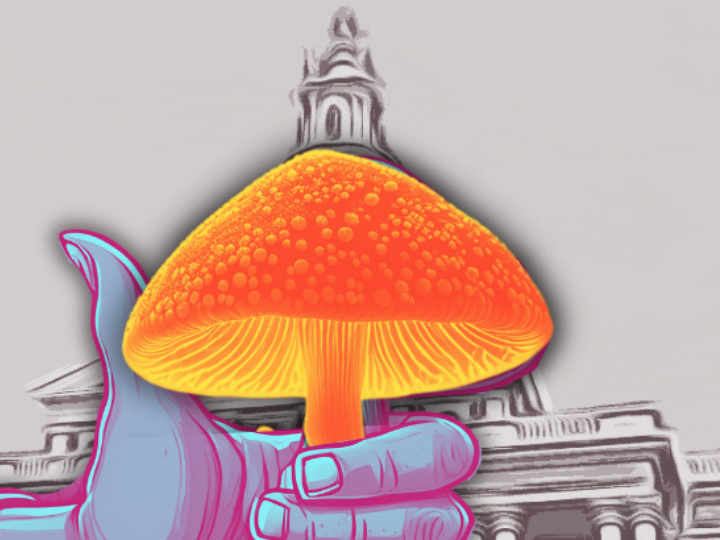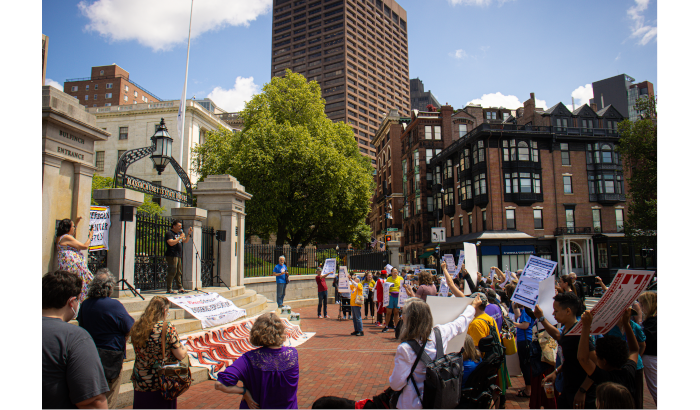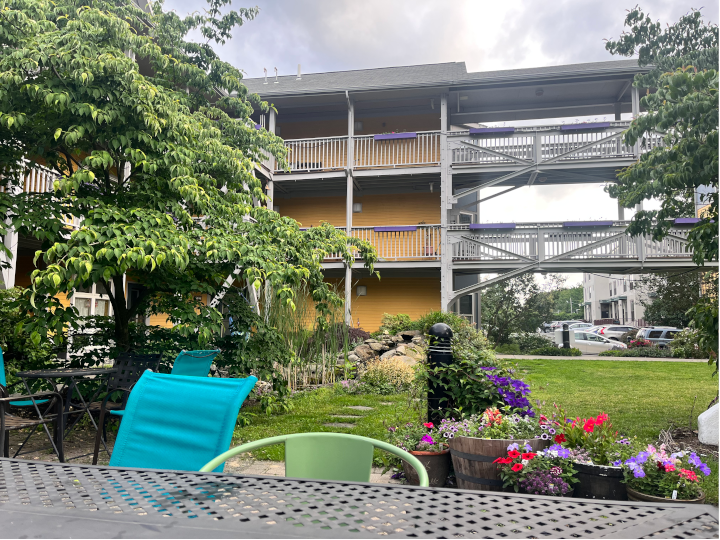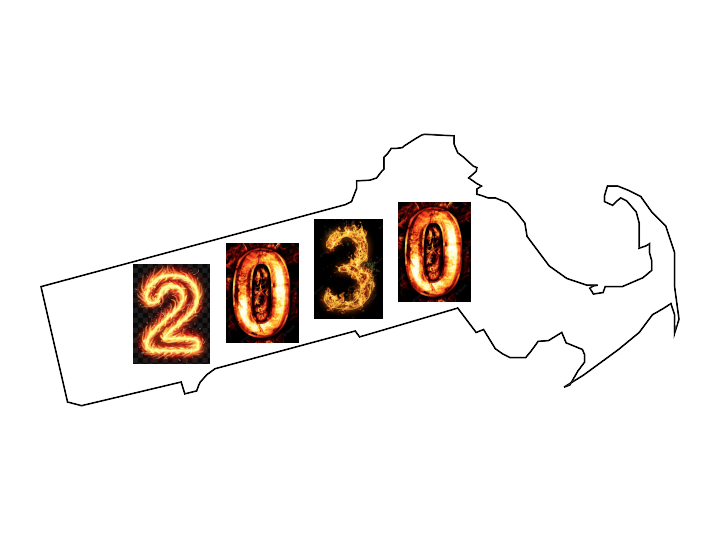Bay State lawmakers file multiple natural medicine-related bills in wake of ballot measure defeat
Psychedelic advocates across the Bay State scored some short-term wins last week—a dozen, to be exact—as commonwealth lawmakers submitted 12 psychedelics-related bills prior to the legislative filing deadline last Friday.
This surge in activity follows the November 2024 defeat of Question 4, the Legalization and Regulation of Psychedelic Substances Initiative, which aimed to legalize therapeutic access to as well as decriminalize the possession and use of psilocybin, psilocin, dimethyltryptamine (DMT), ibogaine, and mescaline for adults 21 and older.
Leading the post-election push for psychedelics in Massachusetts
Jamie Morey and Graham Moore, former campaign staffers for the ballot initiative, have taken the lead in fostering ongoing advocacy for psychedelics reform in Massachusetts. They are co-executive directors of Massachusetts for Mental Health Options (MMHO), the New Approach PAC-backed campaign org that will dissolve at the end of this month.
Speaking for this article, Morey expressed gratitude “to the many lawmakers who responded to our outreach and worked with us to get this historic number of psychedelic bills filed after the disappointing defeat of the ballot question.”
Morey, who is also the founder of Parents for Plant Medicine, continued, “Our small group of grassroots activists was able to make a compelling case to legislators that the majority of Massachusetts citizens do want access to psychedelic healing.” She also highlighted the efforts of her fellow former campaign organizers, particularly CJ LoConte, an Army veteran who played a prominent role in the Q4 campaign, for helping draft and for supporting the proposals.
Tim Morris, a Billerica resident and longtime psychedelics booster on the South Shore, was also instrumental in coordinating outreach with Rep. Marc Lombardo, who filed HD.188, a bill “relative to removing criminal penalties for limited psilocybin possession.”
Henry Morgan, a UMass Amherst undergraduate student, additionally played a key legislative outreach role for the budding coalition. He heralded Lombardo’s bill as “a crucial shift in our advocacy beyond medicalization or commercialization.”
“Drug use remains a fundamental reality we cannot simply criminalize away,” Morgan said. “We must confront the enormous and growing public health crisis of chemical adulteration in the black market to protect consumer health. … Successful reform requires both divestment from criminalization and reinvestment in harm reduction, opportunities, and public good.”
“The grant program [in HD.188],” Morgan added, “will strengthen an ecosystem of autonomous and independent harm-reduction organizations that will address these systemic issues.”
Breakdown of the psychedelic proposals on Beacon Hill
The newly filed bills address a range of issues, from research to decriminalization and legalization. Among them are three pilot program proposals for controlled psychedelic use:
- HD 4017: An Act relative to therapeutic psilocybin treatment centers, filed by Rep. Lindsay Sabadosa. This would establish a “5-site pilot program with locations in western Massachusetts, central Massachusetts, the North Shore area, the South Shore area, and the Metro Boston area” with “non profit therapeutic centers offering psilocybin treatment for mental and physical health needs.”
- HD.4196: An Act establishing a pilot program for access to regulated psilocybin, filed by Rep. Marjorie Decker. This would have the Department of Public Health develop a pilot Psilocybin-Assisted Therapy Program “to allow for the research and development of psilocybin services for adults with post-traumatic stress disorder, end-of-life distress, depression, or other specified conditions, as determined by program criteria and needs in designated geographic areas, as established by the department.”
- SD.1624: An Act authorizing a pilot for the use of psychedelics in licensed treatment facilities, filed by state Sen. Cindy Friedman. Under this bill, the DPH would “establish a pilot program to allow for the monitored mental health care of clinically appropriate patients using psychedelic materials.”
Other significant measures include HD.1003, a psilocybin legalization bill introduced by Rep. Patrick Joseph Kearney, and HD.4243, a psychedelics task force bill spearheaded by Rep. Mike Connolly, who also filed HD.3020, An Act relative to harm reduction and racial justice, a broad-sweeping drug decriminalization bill.
Sen. Dylan Fernandez also filed SD.323, An Act connecting veterans with access to breakthrough treatments. While others introduced four decriminalization bills—HD.3368, HD.188, SD.870, and HD.3895—also reflecting growing public support for reducing penalties for personal use.
While not exactly a psychedelics-friendly bill, Sen. Patrick O’Connor notably filed SD.1408, An Act to conduct a public health study of synthetic drugs in the commonwealth. The summary notes that the term “‘synthetic drug’ shall include, but not be limited to, synthetic opioids, fentanyl, carfentanil, synthetic cocaine, bath salts, MDMA, synthetic marijuana, and synthetic psychedelics.”
The proposed bill from Assistant Minority Leader O’Connor would provide the DPH with funding to, among other things, “develop strategic and legislative recommendations to reduce the use of synthetic drugs by way of public awareness campaigns, educational curriculum, and rehabilitative therapies.”
What’s next for psychedelics advocates in Massachusetts
While Dewey Square Group, which led the Question 4 campaign with a war chest of $8 million, failed spectacularly at the ballot box, public support for psychedelics reform apparently remains strong in the commonwealth. Longtime Marshfield resident Morey, who specifically served as the Q4 campaign’s community engagement director, highlighted how “post-election polling results showed over half support removing criminal penalties for personal use of these substances and roughly two-thirds support legalized therapeutic access.”
For her next activist efforts, Morey is teaming up with LoConte to launch Mass Healing, a new psychedelics advocacy organization, in the weeks ahead. Despite setbacks from the referendum, grassroots backers like them agree that what is important now is to gain real momentum in the coming months and years.
Moore, who was the Yes on 4 educational outreach director, called for a more pragmatic approach to policy reform in the years ahead. “I hope people from both sides of the Question 4 debate can support a more narrow policy,” he said. Moore also emphasized that while he “fought for an expansive policy because [he] believe[s] the government shouldn’t put anyone in prison for possessing a mushroom. … the voters have spoken: psychedelics-for-everyone is off the table.”
“What got lost in the public conversation” Moore opined, was that “there are real individuals, neighbors, friends, family members, who are already using psychedelics as medicine and should not be treated as criminals for a private healthcare choice.” Despite lamenting the nuance-lacking discourse in the runup to last year’s election, he said that he remains “hopeful the law will reflect that sooner rather than later.”
Morey also conceded that “there is still a long road ahead,” but hopes that the numerous bill filings will be a “huge call-to-action that inspires psychedelic supporters across the state to join us in pushing for change.”
This article is syndicated by the MassWire news service of the Boston Institute for Nonprofit Journalism. If you want to see more reporting like this, make a contribution at givetobinj.org.






